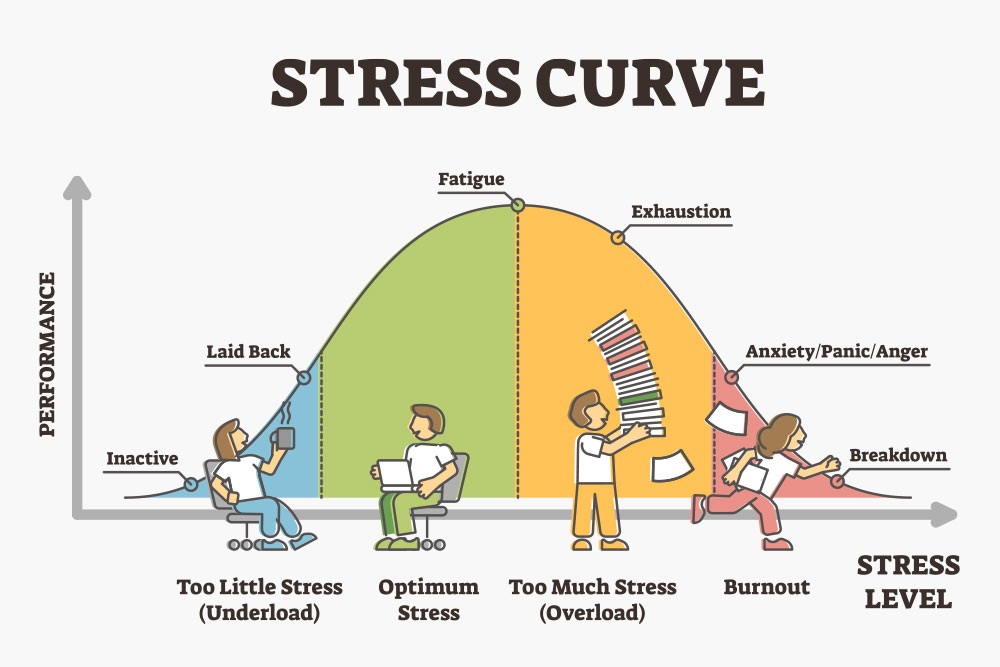
We live in stressful times. And now most of us work in them too.
The pressure to perform and increasingly blurred lines between work and home life leaves many of us struggling to cope.
But stress at work isn’t a certainty. You can learn strategies to overcome it and thrive at your job.
And you won’t just benefit professionally. Tackling stress at work can give you more time and energy to enjoy your life outside of work.
Read our guide to learn what counts as work-related stress, how to identify the triggers and what you can do to manage them for a healthier way of working.
1) Understand What Work-Related Stress Is
Stress is a recognised workplace hazard. According to the Health and Safety Executive (HSE), which regulates workplace health and safety, work-related stress is:
“The adverse reaction people have to excessive pressures or other types of demand placed on them at work.”
So work-related stress is that awful feeling when you can’t cope with your job. It is distinct from feeling under pressure, however.
Stress vs pressure
The HSE definition of stress at work mentions excessive pressure. So it’s clearly expected you’ll face some pressure at work. In fact, the right amount is good for you.
The performance curve is a representation of this. It shows that pressure is a motivating factor that positively affects performance. Until it doesn’t.
Looking at the performance curve, you can see that as pressure increases, so does motivation and your ability to perform. But eventually, we all reach what’s known as the optimal performance level – the best you can achieve under the current conditions. If pressure continues to build after this point, you’ll find performance suffers and feelings of stress develop.
Everyone’s optimal performance level varies because we all handle stress differently. Finding your level and knowing how to stop pressures from building beyond it is essential.

Symptoms of Work-Related Stress
If you’re reading this, you (or someone on your team) are likely experiencing stress at work. Recognising the difference between stress and pressure can help to look at how it affects you.
Symptoms of work-related stress aren’t always the same between people, but there are a few common signs to look out for. These include:
- Losing confidence in yourself or your role
- Losing motivation
- Struggling to concentrate
- Struggling to regulate emotions
- Feeling unable to switch off from work
In addition to these symptoms, you might suffer from physical effects, including:
- Struggling to sleep
- Gaining/losing weight
- Feeling exhausted
- Suffering from headaches or muscular pains
- Feeling nauseous
2) Find Your Stress Triggers
There are various factors in stress and we all experience them differently.
To deal with stress at work, you must understand your tolerance levels and the elements of your role that trigger stress.
You can learn more about the factors influencing how much stress we can tolerate in our previous blog.
There are a few common stress triggers. These include:
- Excessive demands
- Unrealistic deadlines
- Lack of support or training
- Workplace culture
- Strained relationships with colleagues
- Work conditions changing
Many of these issues come down to poor job design or work organisation, making it difficult to address them on your own. It’s also possible that your stress levels are increasing because complex events outside of work have left you unable to handle whatever your job’s throwing at you.
But don’t be disheartened. It’s almost certain you will be able to find one or more strategies to make your work life more manageable.
3) Manage Your Stress Triggers
Once you know your stress triggers, you can start tackling them. The strategies outlined below are an excellent place to start.
Look After Yourself
Eating well, sleeping well and regular exercise are all essential for a healthy state of mind. You may find that a boost in your physical well-being makes it easier to handle pressure at work. So, start with looking after your physical health. This advice applies to any stress or mental health issue.
Take Breaks
You need to be able to take regular, meaningful breaks from your job – both during and after your work hours. Stepping away from your job for a few minutes can help clear your head. It can also benefit your physical health too.
Going for a walk outside on your lunch break gives your legs a much-needed stretch after prolonged sitting. Plus, a break from screens helps avoid eye strain.
Set Achievable Targets
Unrealistic deadlines and expectations are one of the most common stress triggers. So, setting achievable targets is one of the best ways to defuse some of the pressure you face at work.
It’s best to do this in collaboration with your team and superiors. Tell your managers if you feel targets are unrealistic before agreeing on new, feasible goals and a plan to meet them.
Set Boundaries
With more of us working remotely or available 24/7 via our smartphones, it can be tough to separate work and home life.
Make it clear when you’re working and when you’re not. It’s easier said than done, but try to ignore work calls or emails and establish a consistent schedule after a specific time. You might feel that letting issues go unaddressed will make you more stressed but maintaining healthy boundaries can help you return to work with increased focus and renewed motivation.
Let Off Some Steam
What good are clear boundaries if you don’t do anything enjoyable with your time off? Try to do what you love outside of work hours. It could be anything – sport, art, reading – but keep up with your hobbies and find a way to let off some steam.
Ask for Support
Feeling unable to meet your objectives is a common stress trigger, so you must find ways to balance demands and pressures with skills and knowledge.
You can ask your colleagues for advice or your superiors for additional training. You might be able to learn from within your organisation. Still, external training can also give you the skills you need to handle your duties.
Remember, your employer’s responsible for giving you the training and resources you need to do your job correctly. Don’t feel guilty if you can’t do everything straight away.
Brush Up on Your Time Management Skills
Time management is a valuable skill in any role. Knowing how to juggle tasks and maximise your workday can help counteract the pressure of mounting deadlines.
Time management training will help you manage your workload. Still, your employer must also give you adequate time to carry out your duties.
4) Share Your Feelings
For anyone experiencing work-related stress, you must talk to someone.
You can start by discussing your feelings with someone you trust – a relative, partner or friend. Your GP is also great to speak to if you’re struggling.
But to make lasting changes at your job, you should speak to someone in your organisation.
You might find it intimidating to discuss your mental state with colleagues you may not feel comfortable with. And it’s sadly common to face stigma at work. But employers are obligated to protect their staff’s physical and mental health.
You don’t always need to start with your managers. Find out if your organisation has a trained mental health first-aider you can speak with first. Or talk to colleagues you’re close with and let them know you’re struggling. But remember, your employer has to support you, so you should speak to them when you’re ready.
If You’re Struggling to Cope
If you struggle to cope and can’t see a way forward, please seek professional support.
Speak to your GP. Or, if you need immediate support, you can find help right now from a couple of services:
- NHS Support can point you in the direction of qualified emergency mental health practitioners
- The Samaritans are available 24/7 if you need someone to talk to urgently –dial 116 123
Taking the First Step
Since you need to know your stress triggers before you can manage them, a helpful first step is to carry out a stress risk assessment.
Our Stress Risk Assessment Training course will explain how you can identify and manage the causes of stress in your role and help you find healthier ways of working. You can protect yourself from job-related stress and keep at the top of the performance curve.
Plus, employers can use the risk assessment process to identify the problems in job design or work organisation that limit productivity in their business.
About the author(s)

Jonathan Goby



























































































































































































































































































































































































































































































































































































































































